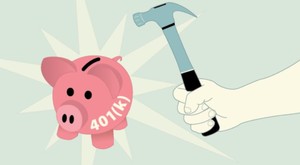Posted on Dec 12, 2018
Eric’s landlord was raising the rent again, and this time Eric decided he was ready to move out and buy his own house. After meeting with a loan officer and getting pre-qualified for a mortgage, the only hurdle remaining was the down payment he would need. Eric didn’t have enough cash saved but his 401(k) account had a healthy balance, and his plan allowed for loans. Should he – or shouldn’t he - borrow the money?
There are pros and cons to taking a loan from your 401(k) account. It’s wise to consider all of your options before making a decision. Are there other low-cost borrowing sources available? Is it worth missing out on the compound growth that your plan investments would have made? Are you foregoing a company match - “free money” - if you are unable to make contributions during the period of the loan? Given that few employees these days can rely on company-funded pensions when they retire, borrowing money from a 401(k) account can end up being a permanent setback to retirement planning unless the money is quickly repaid.
The first step is to check with your plan provider about the terms and conditions of taking out a loan, as well as the fees involved. The Internal Revenue Service has set limits as follows: the maximum amount that the plan can permit as a loan is 50% of the vested account balance, or $50,000, whichever is less.[1] Generally, repayments must occur within five years, with interest that you pay to yourself. Some policies allow the repayment period to be extended for loans used to purchase your principle residence.
It’s also important to be aware of the tax implications if you default on the loan, or if you leave your job for any reason. Should you fail to repay the loan in a timely manner, your loan can go into default and it will be treated as an early withdrawal, subject to penalties and taxes. If your loan is in default and you are laid off or terminated from employment, under new legislation you have until the time you file taxes for the year in which you default to complete an indirect rollover. Otherwise, the outstanding loan amount is considered a distribution, subjected to income tax and a 10% penalty if you are under age 59 and a half.
While there are drawbacks and possible financial consequences, borrowing from your 401(k) may make sense if you have a financial crisis that cannot be resolved in any other way. You may also determine that an investment such as tuition for an advanced degree or a down payment for a house is worth the downside of taking out a 401(k) loan. But be careful when you borrow from your future. Weigh the actual costs of the loan as well as the potential income you would likely have if you didn’t touch the account.
This material is provided for informational purposes only, and is not intended as authoritative guidance, legal advice, or assurance of compliance with state and federal regulations.
[1] https://www.irs.gov/retirement-plans/retirement-plans-faqs-regarding-loans

